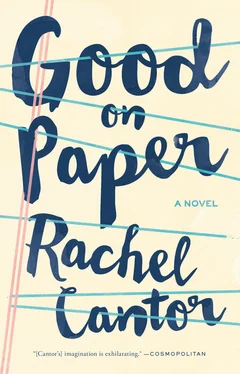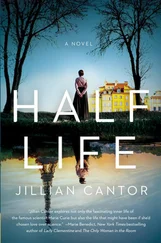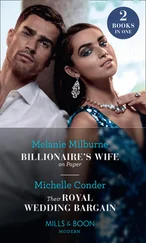Andi stopped jumping and stood over me.
Very interesting, Miss Greene. And what do you think?
I was still congratulating myself on a well-delivered monologue and impressive punchline.
I just told you what I think. What do you mean?
Precisely what I say: What do you think?
What do I personally think about the new life?
This is what I ask.
I think Dante’s new life is a fairy tale, something for children to believe in.
I love fairy tales, Andi said, but I don’t believe in them.
What do you mean by this? Romei asked.
Dante believes we choose new life: if we’re ready to walk the straight and narrow, we can leave our old life behind and achieve salvation. I don’t think so. Stuff happens. People get sick, they win the lottery. But they don’t change.
You think Dante believe that people change?
Of course! Why else would he switch to story-telling? Lyric poems are about the moment, but stories are about change. Dante changes as a result of his encounters with Beatrice, he becomes a better man, a salvageable man, or so he would have us believe.
Look, Mambo, my baby said, bringing her face to mine. I think a tooth is loose. A molar!
GO! I whisper-shouted. Back to your room!
Beatrice isn’t real, I added, so she doesn’t have to change. An idea can be perfect forever.
Andi stomped out of the room.
Very good, Romei said. Thank you. I send tomorrow.
11. SLEEPING WITH NANCY DREW

I had been talking rather a lot about Vita Nuova , but it had been sixteen years since I’d read it. My copies were all in Ahmad’s storage locker, together with other reminders of times past. It wasn’t a place I liked to visit.
I returned to Andi’s room. She was lying on top of her bed, reading Nancy Drew.
We’ll finish this later, I said, gesturing at the pile of clothes on the floor. In the meantime, pajamas.
Mmm, she replied.
I’m going to the basement, I said. Ahmad’s home from dinner; he’s in his studio. When I get back, bedtime.
Mmm, my daughter said, so I took a deep breath and the elevator down to the basement, where I found Vita Nuova and my translation together with three binders of notes from a box underneath six others. Which meant I had to open the other boxes and leaf through them — college papers so full of critical jargon I couldn’t understand them, mementos from a trip to Greece, matchbooks from my wedding. Divorce decree, receipt from the Delhi hotel where Andi had been conceived, baby clothes too precious to part with, early drafts of stories, a topographical map of northern India, the latter a reminder of the road not taken: Dharamsala, my destination interruptus when I found myself with child.
In another box: mementos from my freshman year of high school, which I spent in Rome, during my father’s second sabbatical. My yearbook, for example, which contained the only photos I had left of T. In his senior picture, he sits, smugly, in a rattan chair, his girlfriend of four years on his lap, even though she didn’t go to our school — that’s how inseparable they were considered to be. In Lavinia’s ears, glinting in the black and white sun, fat diamond earrings, gift of her movie producer papa. In the second shot, candid this time, T. leans against a Roman column smoking a cigarette. You can’t see what he looks at through his Ray-Bans — it’s off-camera, and away from the ruin that entrances the rest of the class. For years, I hoped it was me he looked at so possessively; I was in that art history class, I was on that field trip, wherever it was. I’ll never know, nor will I ever be sure that the boy in the semi-distance, with the floodwater pants and Indian mirrored manbag, is Ahmad, giving T. the evil eye. Ahmad knew about us, somehow; I never knew how.
Also, photos of Ahmad and me that same year. The dynamic duo doing all the great poses: cross-dressing American Gothic, Shira pursing her lips, Ahmad holding a devil’s trident. Sistine Chapel redux — our fingers almost touching, Ahmad wearing rubber gloves, Shira’s nails painted dark against a bright white sky. Impossibly young, and happy. We didn’t know yet how it would be: fighting that spring over T., reconciling after my divorce, words spoken when he blamed me for Jonah’s death, reconciling again over Andi. And there she was, our red-faced baby, sleeping in my exhausted arms. Dribbling carrot in her high chair, smiling a demented orange smile, Ahmad behind her, brandishing a spoon. Aunt Emma trying to smile over Andi’s stroller, managing only to look disapproving, Andi raising her hands and face to the sky as if blessing the host.
Also, photos I discovered when my father died, too small, their edges white and scalloped, from our first sabbatical — of my father, complacent, Eleanor, my mother, laughing, Shira, seven, wearing an orange Danskin shirt-and-shorts set, distracted always by something outside the frame. My mother, her eyes shaded by cat glasses, wearing a broad-brimmed hat, pointing at the Pantheon; I, crouching at her feet, conversing with pigeons, in the background reading a book, smiling fiercely above a decapitated statue. My father, the photographer, Eleanor his object, I there only incidentally: because her arm encircles me (I seem uncomfortable, suspicious), because I squat in her shadow, privately playing.
There were no photos after that year, no photos after she left us.
Feeling too tender, I carted the volumes, notes, and binders to my study, where I found Tinky Winky sitting on a stack of Italian dictionaries.
Had he been there before?
Are you in exile again? Just like Dante! Look! and I showed him an Italian edition of Vita Nuova , a rumpled Garzanti with its outdated bibliography and puzzling snippet of Giotto’s Life of Maria and Life of Christ on the cover. Inside, an engraving of the Poet in Profile, his arrogant, heavy-lidded expression, his laurel wreath, his ever-present snood.
I know! I said. He’s insufferable!
I doodled on Dante’s face, gave him bloodshot eyes and pimples. Then tucked him under some secondary sources.
Tink looked at me funny. Not a word from you, I said, and chose a photocopied article, settled back onto the loveseat, a tape recorder balanced on my chest like a kitten. “Dante and the Schoolmen,” I dictated. Domenico da Firenze sees the influence of the Scholastics in Dante’s use of … etc.
I read prefaces, afterwords, footnotes, marginalia. I reacquainted myself with debates that raged in the ’70s. I read about Dante’s politics, his theology and fondness for numbers; I lost myself in criticism structural, post-structural, post-non-denominational. I read everything, in short, but Vita Nuova itself.
When I finally thought to look at the time, it was after midnight.
Andi! Oh, no! Was she still awake? I tiptoed into her room, found her sleeping with Nancy Drew. I carefully removed the book from her hand, found her Brooklyn Zoo crocodile bookmark, put the book under her pillow next to her flashlight, in case she woke up and had to read some more.
My dear, my dearest, my sweetest sweetest heart! How could I have forgotten you? Next morning I’d have to pretend I’d done it on purpose, so she could feel her late night was a gift and not evidence of maternal neglect. Gently, I maneuvered her under the covers.
Why is that man my uncle? she said, slipping her thumb into her mouth.
I stifled a laugh, unable to imagine what she must be dreaming.
You have no uncles, I whispered. Good night, precious pumpkin.
Читать дальше













